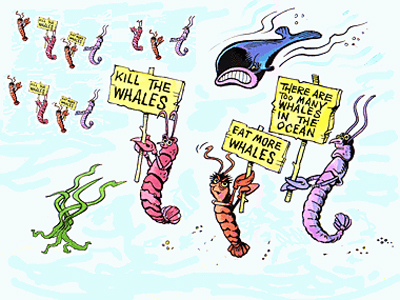plankto-, plankt-, -plankton
(Greek: passively drifting, wandering, or roaming)
2. A general term for many floating marine forms, mostly of microscopic or minute size: Plankton are moved passively by winds, waves, tides, or currents.
Plankton include diatoms, algae, copepods, and many protozoans, crustacea, mollusks, and worms.

There is no doubt that plankton are supporters of the Japanese endeavors to kill more whales and hope that they succeed in eliminating more for their "research"! Some whales eat fish, and some species of whales are equipped to eat plankton in great quantities.
Plant Plankton Also Exist in the Oceans
Plant plankton in the Southern Ocean suck carbon dioxide out of the air during photosynthesis, and when they die or are consumed by other organisms, some of that carbon ends up on the ocean bed.
It is well known that the amount of iron available to the plankton is what limits their growth; and the iron is carried across the ocean in the same clouds of dust that carry aluminium.
So more dust may mean more plankton, and therefore a bigger conveyor belt sinking carbon dioxide to the bottom of the ocean; one of the Earth's biggest carbon sinks.
For more details about planktonic life, see Plankton Varieties.
Inter-related cross references, directly or indirectly, involving the "sea" and the "ocean" bodies of water: abysso- (bottomless); Atlantic; batho-, bathy- (depth); bentho- (deep, depth); halio-, halo- (salt or "the sea"); mare, mari- (sea); necto-, nekto- (swimming); oceano-; pelago- (sea, ocean); thalasso- (sea, ocean).


